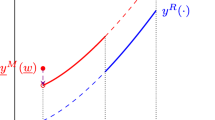Abstract.
We consider the problem of allocating a list of indivisible goods and some amount of an infinitely divisible good among agents with equal rights on these resources, and investigate the implications of the following requirement on allocation rules: when the preferences of some of the agents change, all agents whose preferences are fixed should (weakly) gain, or they should all (weakly) lose. This condition is an application of a general principle of solidarity discussed in Thomson (1990b) under the name “replacement principle”. We look for selections from the no-envy solution satisfying this property. We show that in the general case, when the number of objects is arbitrary, there is no such selection. However, in the one-object case (a single prize), up to Pareto-indifference, there is only one selection from the no-envy solution satisfying the property. Such a solution always selects an envy-free allocation at which the winner of the prize is indifferent between his bundle and the losers’ common bundle.
Similar content being viewed by others
Author information
Authors and Affiliations
Additional information
Received: 15 May 1995 / Accepted: 5 June 1996
Rights and permissions
About this article
Cite this article
Thomson, W. The replacement principle in economies with indivisible goods. Soc Choice Welfare 15, 57–66 (1997). https://doi.org/10.1007/s003550050091
Issue Date:
DOI: https://doi.org/10.1007/s003550050091




